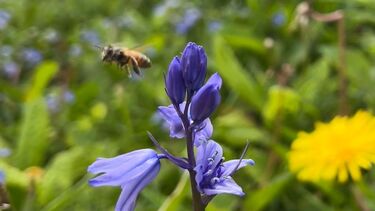The project will deliver five innovative demonstration cases across Europe that will aim to change mindsets, affect policy, and provide a blueprint for scaling up Nature Based Solutions (NBS) in cities.
‚ÄòINNATURE: Enhancing Biodiversity and Social Inclusion by Transforming Europe‚Äôs Living Environments‚Äô, will be led by Professor Doina Petrescu at the University of ∫˘¬´”∞“µ, in collaboration with ∫˘¬´”∞“µ Hallam University and Regather Collective.
Globally, the built environment contributes to exploitation of natural resources, the pollution of air, water and soil, biodiversity decline, and ultimately climate change. However, the built environment and its stakeholders also hold the solutions to limit, and reverse, these impacts through innovations that drive societal changes and imagine new ways of living.
When designed and implemented well, NBS can support biodiversity, improve air, soil and water quality, and sequester carbon, helping to mitigate climate change.
In addition, a closer connection to nature also supports human health and well-being, climate adaptation and resilience (e.g., reduced urban heat island effect, flood prevention etc.).
However, many NBS fail to maximise these benefits or do not work over time, exacerbated by a lack of community involvement. Moreover, not everyone benefits equally from NBS, especially diverse groups (youth, older people, immigrants, women, disabled people) who may also face socioeconomic marginalisation, spatial segregation, or urban decay.
In response, the new project aims to co-create five diverse NBS demonstration cases across Europe (Belgium, Denmark, Finland, Romania, UK) that are inclusive, beautiful and sustainable (the three key pillars of the New European Bauhaus).
The project will demonstrate the co-benefits of NBS by involving diverse communities, artists and designers, ecologists, researchers, policy-makers, businesses and other city stakeholders in the design, care and maintenance of these areas. These diverse groups will reimagine how the city can work in terms of biodiversity and ecology, as well as socially and culturally. This collaborative approach aims to change people’s views about NBS, affect policy, and provide a blueprint to accelerate and scale-up NBS in different contexts locally and across Europe.
The four year project begins in September 2025 and involves a consortium of 20 partners from 7 countries led by University of Tampere. ∫˘¬´”∞“µ team includes Professor Doina Petrescu (PI UK team and WP leader), Dr. Krzysztof Nawratek, Dr. Tanzil Safique, Dr. Nicola Demsey and Carolyn Butterworth from the School of Architecture and Landscape. In addition to ∫˘¬´”∞“µ Hallam and Regather Collective, the team will collaborate with Gleadless Valley Wildlife Trust and ∫˘¬´”∞“µ City Council.
The focus of the activity in ∫˘¬´”∞“µ will be to develop a demonstration case titled ‚ÄòLandscape Connector‚Äô and an eco-social living lab in Gleadless Valley. This will include biodiversity monitoring and enhancement, citizen science, nature-restorative design, and local education initiatives.
Professor Petrescu said: “We hope that establishing an eco-civic lab in Gleadless Valley will encourage local citizen participation in learning about, caring for, and valuing their relationship with nature in their immediate environment.
The project will also actively involve civic, private and public actors already engaged in the area’s regeneration process. By framing these efforts within an international network, we aim to facilitate exchange, comparison, and shared learning from other contexts across Europe.”
The project has received ‚Ǩ5M in funding from the European Commission‚Äôs EU Horizon Europe grant, of which the University of ∫˘¬´”∞“µ has received over ‚Ǩ480,000.

